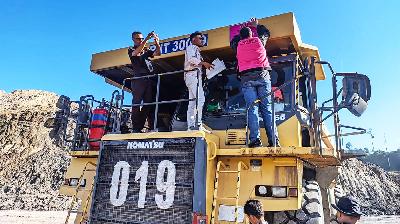The Slow Implementation of Forest Fire Sanctions
The state is yet to receive compensation payments totaling Rp19 trillion from companies that burned forests. A slow implementation of court rulings.
Tempo
May 27, 2024

UPHOLDING the law is the weak point in the handling of forest fire in Indonesia. Even after the courts passed rulings, they are not immediately implemented. This was proved from the series of rulings on civil cases related to the burning of forests and land from 2014 to 2015 that have not yet been implemented.
The government has won at least 11 civil lawsuits against companies burning forests and land. The state should have received compensation and recovery payments totaling around Rp20 trillion. But so far, the compensation paid has only been a few hundreds of billions of rupiah.
The burning of forests and land in the last decade has been the most widespread in history. In the last two years alone, the area burned in Sumatra and Kalimantan has reached 2,611,411 hectares, including 891,275 hectares of peatland, equivalent to almost 40 times the area of Jakarta.
The losses have been enormous, in terms of economics, health and politics. As a result of inhaling smoke from the fire, for example, thousands of people have suffered from acute respiratory tract infections. And the government has had to allocate substantial funds to extinguishing the fires. According to an estimate from the National Disaster Mitigation Agency, it costs at least Rp140 million to extinguish each hectare.
Indonesia has also received negative publicity from the international community. Neighboring states, such as Singapore and Malaysia, have protested because this smoke has also affected them. The emissions from the fires, according to the World Resources Institute, exceed Germany’s annual emissions. In 2015, Indonesia was one of the top five contributors to global emissions.
It only costs between Rp200,000 and Rp300,000 to clear a hectare using burning, much cheaper than using heavy equipment, which can cost Rp4 million to Rp5 million per hectare. However, this burning of land that is cheap for companies has proved expensive for the state and the people. Therefore, companies that burn forests should pay substantial compensation.
But the fact is that of the total compensation the state should have received, only Rp131 billion has actually been paid. More than Rp19 trillion is still on hold because of problems with the implementation of rulings. The Environment and Forestry Ministry claims that the delays are with the district courts that have the authority to implement the rulings.
It is absurd that for years the government has seemingly been unable to find a solution to this problem. Unsurprisingly, this has led to suspicions. Everybody knows that the Joko Widodo administration has a policy of “rolling out red carpet for investors” to spur on economic growth. Probably, the government’s lack of resolve towards the companies burning forests is part of this policy.
The government's soft stance has only served to reinforce the opinion that the principle of “equality before the law” is only an empty phrase in this country. What actually happens is that the law is sharp at the bottom and blunt at the top. In everyday practice, court rulings are implemented very quickly if they are directed against the poor.
There is no reason for the government or the courts to delay the implementation of these forest burning rulings. Corporations that burn forests must be immediately forced to pay compensation and recovery funds. Only strong law enforcement will prevent, or at least reduce, similar occurrences in the future.

